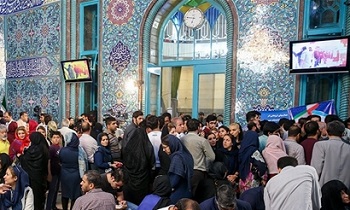
RNA - They did cast ballots in their Presidential and City Council Elections – the 12th for president and the 35th overall since 1979 revolution - precisely because they do believe in their democratic system. Unlike what “fakestream” media in the West would like to suggest, elections in Iran are not “window-dressing” or “political theater.” They do really matter. There is no limited range of choices offered to voters; the vote is not theater; it’s not cover for the feckless pursuit of power between elites; and it actually adds up to something – which is yet to be the case in other parts of the Persian Gulf.
Nor is that all:
1) Iran is the only democracy in the Middle East that offers guarantees for either side of the political spectrum. You win, you assume power. That’s why, as maintained by Iranian Leader Ayatollah Seyed Ali Khamenei, “Even those who don’t believe in the system and the leadership come to the ballots.” There is also a sense among many Iranians that the site of chaos and bloody war in the Middle East and North Africa offers the best situation for all involved. Seen in this light, no one wants Iran to become “another Syria” or “another Iraq.” The election is an opportunity for further unity and progress; to say no to foreign meddling in domestic affairs.
2) There is no mystery to all this, no puzzle for analysts to solve. If anything, the election belongs to the nation, and there is transparency on the part of the public and the authorities alike. The Friday vote will have profound consequences not just for Iran but for the region. It will prove decisive in shaping the balance of powe. That’s why the May 19 vote should not be disregarded or dismissed as "mere window-dressing.”
3) Iran’s electoral exercises provide important barometers on political trends and have always served as critical junctures in the life-cycle of the system, which is both Islamic and democratic. Here in religious democracy, religious values also play a role in public arena. It is an example of how democratic values could exist in a different cultural elaboration than what is usually known in the West.
4) The high turnout demonstrates that people are both interested in the results of their contributions and how such contributions affect major decisions. They believe that their presence in the vote will open a new and beneficial chapter ahead of them. They expect to witness the impact of their decision in their lives describing their effective, timely, massive and enthusiastic participation as evidence to this.
5) The Friday vote will bring about beneficial results for people and such a trend greatly expand independence, competition and democracy within the Iranian society. Sovereignty and freedom are manifestations of political participation in the Iranian society which is also a sign of democracy that would promote independence and sovereignty among the nation which will assist people to have a more positive and enthusiastic perspective towards life.
6) The only winner of the polls is the Iranian nation that once again passed the difficult test of demonstrating national unity and solidarity in the face of foreign threats and conspiracies. The Friday vote is set to shape the country’s future for a generation, potentially even more so than the previous ones, leading toward a higher quality of democratic governance.
In sum, voting or staying politically active is not something that the Iranians really have a problem doing. When the founding figures of the Islamic Republic began to put together the all-inclusive government back in 1979, they made sure that the people of all faiths, Muslims, Christians, Jews, and Zoroastrians, always had power over the government. Officials are elected by the people, laws can be changed, and the people can vote to remove or give power to the government. That's why Iran is a democracy, a system where decisions are made by the majority of votes. The people can make important political decisions, but the system only works if they stay informed and continue to participate.
On Friday, May 19, the engaged and informed people of Iran did just that en masse. They were expected to. Voting is the most powerful system in Iran that protects the power of the people. Many things they decide as a nation are done through direct voting, which is when individual citizens vote and the majority of votes determines the outcome.
847/940